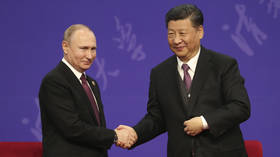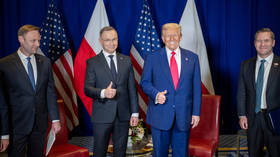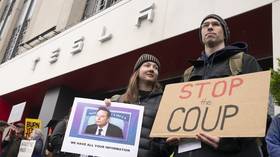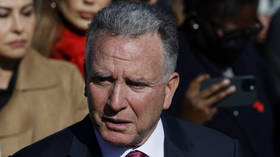TTIP risks to health & environment, 'US pressure on EU' revealed in secret docs leaked by Greenpeace
The controversial trade deal between the EU and the US could affect public health, people’s rights, internet privacy and the environment badly, Greenpeace says, citing leaked negotiation texts. The US is pressuring the EU over the deal, a report on the texts alleges.
The 248 pages of classified negotiation papers on The Transatlantic Trade and Investment Partnership (TTIP) were released by Greenpeace Netherlands on Monday.
“This treaty is threatening to have far-reaching implications for the environment and the lives of more than 800 million citizens in the EU and US,” a Greenpeace statement says.
Secret #TTIP papers live RIGHT NOW at https://t.co/3bpw2igIBJ via @greenpeaceNL#TTIPLeaks#stopTTIP#Greenpeacepic.twitter.com/Qia5ARgh9H
— Greenpeace (@Greenpeace) May 2, 2016
The TTIP is “about a huge transfer of power from people to big business,” according to the group.
Greenpeace says the papers’ authenticity is confirmed by an investigative research team consisting of Rechercheverbund NDR, WDR und Süddeutsche Zeitung media outlets.
Washington is blocking European car exports into the US to force the EU to buy more environmentally risky US farm produce, Sueddeutsche Zeitung reported after analyzing the documents.
The US Trade Representative’s office has shrugged off the allegations, declining to comment on the “validity of alleged leaks,” a spokesperson said, adding, “the interpretations being given to these texts appear to be misleading at best and flat-out wrong at worst,” Reuters reported.
The deal will result in abandoning long-standing environmental protections, Greenpeace says.
“The US demand for a ‘risk based’ approach that aims to manage hazardous substances rather than avoid them, finds its way into various chapters. This approach undermines the ability of regulators to take preventive measures, for example regarding controversial substances like hormone disrupting chemicals,” the statement reads.
Secret #TTIP papers live RIGHT NOW. Read them at https://t.co/0rCEvq2k64#greenpeace#TTIPleaks#stopTTIPpic.twitter.com/7Gkr82q1K8
— Greenpeace Nederland (@GreenpeaceNL) May 2, 2016
Greenpeace has been worried that the negotiation papers do not mention General Exceptions rules, which would allow nations to regulate trade “to protect human, animal and plant life or health" or for "the conservation of exhaustible natural resources."
“The omission of this regulation suggests both sides are creating a regime that places profit ahead of human, animal and plant life and health,” Greenpeace says.
“Whether you care about environmental issues, animal welfare, labor rights or internet privacy, you should be concerned about what is in these leaked documents. They underline the strong objections civil society and millions of people around the world have voiced.”
Cecilia Malmstrom, a European Commissioner for Trade, wrote a blog post, saying the documents “reflect each side’s negotiating position, nothing else.”
“It is only normal that both parties in a negotiation want to achieve as many of their own objectives as possible. That does not mean that the other side gives in to those demands. That does not mean that the parties will meet halfway,” she added.
EU chief negotiator Ignacio Garcia Bercero also dismissed Greenpeace’s report, saying: “We have made crystal clear that we would not agree on anything that implies changes of our regulatory regime on GMOs.”
#Climate protection seems absent from #TTIP papers. Did EU & US already forget Paris?? #TTIPleaks#Greenpeacepic.twitter.com/2KhMyxhEaZ
— Greenpeace Nederland (@GreenpeaceNL) May 2, 2016
While the Transatlantic Trade and Investment Partnership (TTIP) between the US and Europe is set to create the world's largest free trade zone, many Europeans worry the agreement would elevate corporate interest above national interest. TTIP opponents say that cheaper goods and services would only hurt the EU and help the US.
Europeans argue that international corporations would be given power at the expensive of small and medium-sized businesses. The secrecy surrounding the negotiations has also come under fierce criticism.
What do you think transparency looks like? #TTIPleakspic.twitter.com/QEQefYU11x
— Greenpeace Nederland (@GreenpeaceNL) May 2, 2016
Just a day before Obama's visit to Germany, thousands of anti-TTIP protesters hit the streets of Hanover.
According to a recent survey conducted by pollsters YouGov on behalf of the Bertelsmann Foundation, only 17 percent of Germans think the TTIP is a good thing, down from 55 percent two years ago. In the United States, only 18 percent of people now support the deal, compared to 53 percent in 2014.













